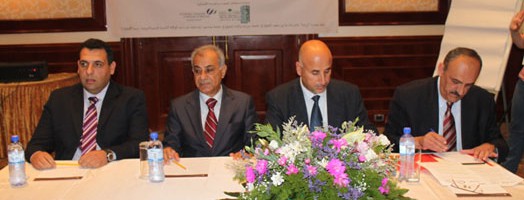Second Course of the Judicial Training Curricula Development Program
In Partnership with the Karamah Initiative at the IoL, the Higher Judicial Council started the implementation of the Second Course of the Judicial Training Curricula Development Program
Judge Fareed Al-Jallad, the Chief of the High Court and the Chairperson of the Higher Judicial Council, opened today in Jericho the Second Course of the Judicial Training Curricula Development Program. The Vice-President of Birzeit University for Academic Affairs, Dr. Munir Qazaz, the Director of the Birzeit University (BZU) Institute of Law (IoL), Dr. Ghassan Faramand, and 23 judges from the magistrate, first instance, and appeals courts from all the Palestinian governorates took part in the opening session of the course.
Judge Fareed Al-Jallad stressed in his opening address the importance of cooperation between the Palestinian judiciary and Canadian judiciary, the support of the Canadian Agency for International Development (CIDA), and the support of the Birzeit University Rule of Law and Human Dignity (Karamah) Initiative in realizing important accomplishments for the judiciary. He praised this project, considered one of its kind in terms of blending the academic and judicial cultures, which imparts on judges research skills, leading to the contribution to the enhancement of judicial independence and serving Palestinian citizens.
Al-Jallad also praised the previous experience and successes of the Judicial Training Curricula Development Program. Through that project, judicial curricula in the following four legal fields were developed: juvenile justice, owners’ and renters’ law, implementation law, and insurance law. He hoped that such programs will reflect positively on all the sectors of the Palestinian judiciary.
As for Dr. Munir Qazaz, the Vice-President of Birzeit University for Academic Affairs, he said that “an active, independent judicial authority is the fundamental basis for guaranteeing human rights and dignity, in a climate justice and equality”. He also affirmed the University is keen on establishing strong relations with the Palestinian official institutions, which involve carrying out programs aimed at serving the justice sector institutions in Palestine.
Dr. Ghassan Faramand, the Director of the IoL, expressed his wish that the second course of the program would be successful. He said this was due to his recognition of the importance of the development of the judicial training curricula, and the institutionalization of this process.
In the conclusion of the opening session, the judges participating in the course divided themselves into five groups. Each group addressed one of the following legal topics: Rules of Civil Procedures Law, Evidence Law, Labor Law, Penal Procedures Law, and the Civil Code.
The first period of the group work will last for three days, and will be followed by a series of meetings within a specific time schedule, lasting until October of the current year. At the end of the course, this group of judicial training curricula in the said topics would be completed and tried.
The Judicial Training Curricula Development Program aims at enhancing the skills of Palestinian judges in the area of creating curricula for training judges, through a participatory group effort lead by judges themselves, in cooperation with the Karamah Initiative, aided by educational experts from the Ibn Rushd Educational Development Unit at BZU.
The Karamah Initiative is implemented through partnership between the Institute of Law at BZU and the College of Law at Winsor University. The Initiative is a beneficiary of Canadian government support provided through the Canadian Agency for International Development (CIDA).





